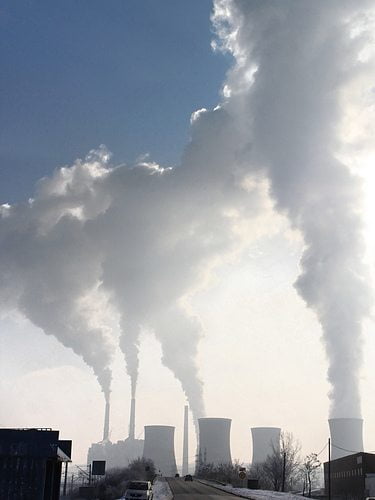

Features
AODP: We need to divest from carbon and climate risk not companies
Divesting from fossil fuel companies is not the most effective solution to climate change and reducing carbon risk, according to the Asset Owners Disclosure Project (AODP). In an open letter to the Bill and Melinda Gates Foundation and Wellcome Trust, which are currently being targeted by a divestment campaign, CEO of the organisation Julian Poulter sets out an alternative.
Dear Mr and Mrs Gates and Mr Farrar,
We note The Guardian’s recent campaign targeting your foundations for investing in fossil fuel assets and would like to offer some insights, which we hope will help you reduce your funds’ exposure to carbon risk.
Firstly, as a solution to climate change we don’t believe that an immediate wholesale divestment of fossil fuel investments is either necessary or desirable. It is carbon and climate risk that we need to divest from, not companies. The vast majority of fossil fuel assets are unlisted, hence any delisting of fossil fuels will likely end up in hedge funds and offshore sovereign wealth funds.
Secondly, at a pure portfolio risk level, while they are a big part of the problem, the fossil fuel extraction companies actually create little greenhouse gas. You have just as big a problem in your portfolio from sectors like energy, manufacturing, transportation and others who are exposed to carbon in other ways.
Finally, we do find it odd that two funds, which combined would not feature in AODP’s top 100 largest asset owners, are being targeted when there are so many bigger funds to pressurise.
AODP believes that there are solid financial risk reasons for reducing carbon risk across asset owners’ portfolios and being transparent about how you do this. The real issue is how your fund assesses, or in finance language ‘prices’, the forward risk of carbon into your investments. The uncertainty alone requires a risk premium given that it is impossible to avoid or diversify.
The ratio of climate exposed investments to low carbon ones is normally around 20-1 and this is a huge gamble for your fund under most scenarios. We also don’t think that any fund can rely on short-term markets to properly price this longer-term risk or rely on them to sell your exposed assets for a profit at the same time that everyone else is selling.
We think that portfolio value can best be protected through a three-pronged attack of divestment, engagement, and hedging. Our ratings methodology follows this approach. The hedging is particularly important. Whilst many people claim there simply isn’t enough good low carbon investments that are profitable, they fail to properly price the long-term risks on the high carbon side that bring many clean investments forecasts into profit. When the world of stranded assets arrives at the door of fossil fuel based investments, this clean ‘hedge’ will balance those losses.
We did contact your foundation requesting data on how you manage these risks last year in preparation for the new 2015 Index, published in April. Indeed a response might even have negated the need for The Guardian’s campaign, as your portfolio carbon exposure is included as a key metric in your AODP response.
You may have seen the Financial Times article quoting Anne Stausboll, CEO of CalPERS, the largest fund in the USA, discounting divestment as a viable option. We mostly agree with CalPERS although there are some easy divestment wins on some undiversified and high cost fossil fuel companies and some underweighting opportunities that wouldn’t lessen the engagement power by too much but could substantially reduce portfolio carbon risk.
But taking Ms Stausbolls point still further, with pure divestment being discarded by the large asset owners, strong engagement with specific planned outcomes must be a focus. This has never really been attempted and there have been less than ten climate resolutions put to companies outside the US (where they are non-binding) and if engagement is to remain credible then a show of strength is required. We don’t believe that pension beneficiaries or your stakeholders such as taxpayers will accept polite enquiries as an excuse for proper engagement and so we recommend your fund co-files a series of resolutions to this end. We imagine that if such resolutions were to fail due to a lack of support that you might then have to consider divestment or increase your low carbon hedge in order to meet your climate risk reduction goals.
In conclusion, we have some sympathy for your current predicament but I am afraid that this is a sign of things to come. In most foundations, the grant making and investment departments are total separated, but in this case there is no need for foundation investment departments to rely on moral or ethical arguments to meet this unique challenge. The leading asset owners are already aware of this challenge and are disclosing fully to us how they are progressing on this complex journey. Through better management of the risks, their portfolios will survive the volatile transition better than other funds. We recommend climate risk management leadership as your next step as you are better placed than most to set a good example.
Yours truly,
Julian Poulter
CEO, Asset Owners Disclosure Project
Photo: Emilian Robert Vicol via Flickr
Further reading:
London assembly backs fossil fuel divestment
Divestment: University of London’s school freezes fossil fuels investment
UN backing fossil fuel divestment campaign


 Features11 months ago
Features11 months agoEco-Friendly Cryptocurrencies: Sustainable Investment Choices

 Energy11 months ago
Energy11 months agoThe Growing Role of Solar Panels in Ireland’s Energy Future

 Energy10 months ago
Energy10 months agoGrowth of Solar Power in Dublin: A Sustainable Revolution

 Energy10 months ago
Energy10 months agoRenewable Energy Adoption Can Combat Climate Change



























